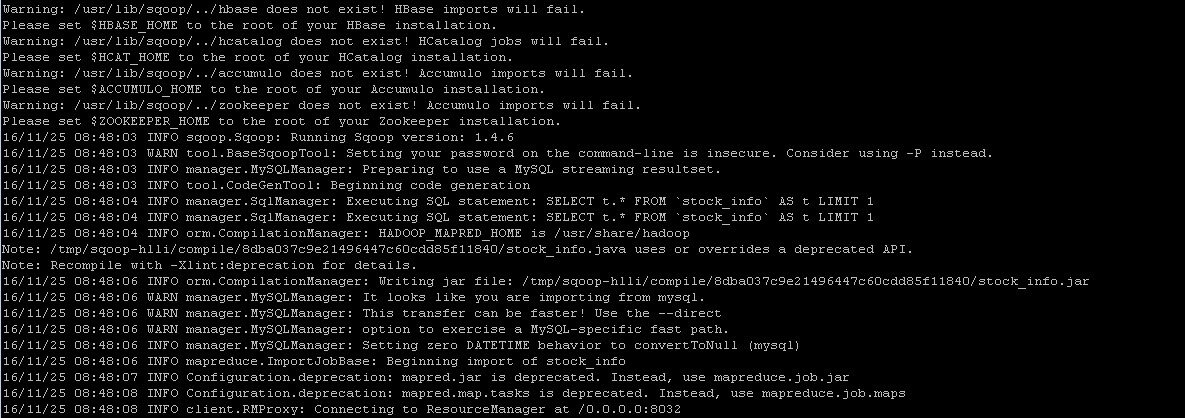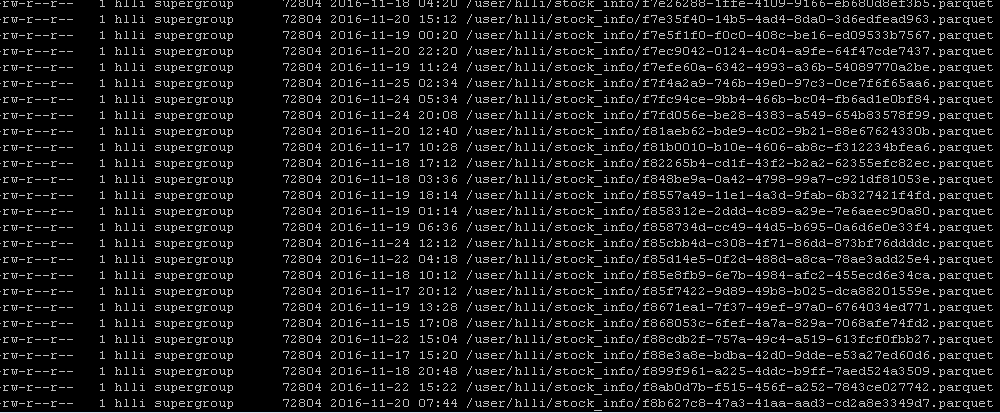Sqoop is a tool designed for efficiently transferring data between RDBMS and HDFS, we can import data from mysql, oracle, and other data bases into HDFS very easily; meanwhile we can dump data into data base from HDFS. For detailed documentation, please refer to sqoop documentation.
Before using Sqoop, please follow steps to setup it correctly.
Sqoop - Import
the following command is used for import
sqoop import (generic-args) (import-args)
given a table named stock_info, and the schema is:

Case 1: we can use below command to import stock_info data to hadoop hdfs file system:
sqoop import --connect jdbc:mysql://host:port/dbname --username loginuser --password loginuser --table stock_info --m 1
and the result looks like:

we can verify result in hdfs by running command
hadoop fs -cat /emp/part-m-*
Case 2: sepcify the target directory in hdfs by running the following import command
sqoop import --connect jdbc:mysql://host:port/dbname --username loginuser --password loginuser --table stock_info --m 1 --target-dir /temp
then we can verify result by executing the same command as above
Case 3: imcremental import by specifying --incremental, --check-column and --append arguments. Note we should change 'last_chg_date' when applying other tables.
sqoop import --connect jdbc:mysql://host:port/dbname --username loginuser --password loginuser --table stock_info --m 1 --target-dir /temp --incremental lastmodified --check-column last_chg_date --append
Case 4: specify target file format as parquet format by adding argument '--as-parquetfile'
sqoop import --connect jdbc:mysql://host:port/dbname --username loginuser --password loginuser --table stock_info --m 1 --target-dir /temp --incremental lastmodified --check-column last_chg_date --append --as-parquetfile
Case 5: import all tables
sqoop import-all-tables --connect jdbc:mysql://host:port/dbname --username loginuser --password loginuser
Sqoop - Export
export means to dump data from hdfs to mysql, oracle or other data bases, command syntax is like
sqoop export (generic-args) (export-args)
given there are many parquet files under stock_info folder which is imported by sqoop import command incrementally

then we want to dump data back into mysql data base, using the following command
sqoop export --connent jdbc:mysql://host:port/dbname --username loginuser --password loginuser --table stock_info --export-dir /user/hlli/stock_info
finally verify data in mysql command line
select * from stock_info;
Incremental importing data
by using linux timer 'crontab' to schedule a job to execute importing periodically.
cd /var/spool/cron
touch hlli (please change hlli to your user name here)
vi hlli
*/5 * * * * /usr/lib/sqoop/bin/sqoop import --connect jdbc:mysql://host:port/dbname --username loginuser --password loginuser --table stock_info --m 1 --target-dir /temp --incremental lastmodified --check-column last_chg_date --append --as-parquetfile
if it works, you will receive email in '/var/spool/mail/hlli'; meanwhile we can verify data by running command
hadoop fs -ls /
Commonly used Sqoop commands
sqoop help import
sqoop help export
sqoop help job
sqoop help codegen
sqoop help eval
sqoop help list-tables
sqoop help list-databases
sqoop help import-all-tables
References:
- http://sqoop.apache.org/
- http://man.linuxde.net/crontab